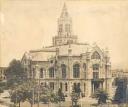When tales are told of the history of the Tex-Mex restaurant and live-music venue Last Concert Cafe (1403 Nance), it can be difficult to separate the facts from the mythology. But the story goes something like this:
The Early Days…
Legend has it that either the building in which the restaurant is located or the house next door was once a bordello. The small-looking house supposedly has eight bedrooms, but no kitchen.
1940’s…
The Last Concert Cafe was opened as a restaurant in 1949, by Elena “Mama” Lopez, who was then 62. The name came from Lopez’ statement that the restaurant would be her last business endeavor. Which it may well have been – but then, Lopez lived to be 95, and operated the restaurant into her nineties, and so was able to enjoy quite a lengthy swan song.
1960’s…
In the early 1960’s, the Last Concert Cafe reputedly served as one of Houston’s first gay bars, and was the site of a marjuana bust that was, at the time, the the largest in the city’s history (though the latter may have happened in the 1950’s, and not the 1960’s).
It’s also said that, when I-10 was being built in the late 1960’s, the restaurant stood right in its intended path; but that Lopez held some sway with city officials, and that the highway was rerouted to save the building. Lopez’ influence may or may not have had something to do with a memory that extended back to the restaurant’s alleged bordello days.
The Traditions…
The most famous tradition at Last Concert is to knock twice on the locked front door for admittance. There are conflicting accounts of the origin of the tradition, perhaps because there are so many different possible reasons why, at different points in the building’s early history, there would not have been a general admittance policy. For many years, there was not even a doorknob on the outside of the door. City regulations changed that, and visitors may even find the front door unlocked – but it’s nice to think that some customers still follow the protocol of knocking for entry.
Another tradition is that the name of the restaurant is not posted out front. (However, a sign was noted recently – posted down the street – reassuring first-timers that they are headed in the right direction. Understandable given that friends’ directions may be no more detailed than “head north out of downtown on San Jacinto, and keep to the right until you see Nance”.)
More information:
Last Concert Cafe website
Parks, L.B., “A good cafe is hard to find”, Houston Chronicle, Sept. 17, 1988



